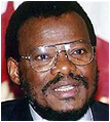This Day in History: September 27, 1992
Additional Date: September 27, 1992
At a meeting held in Ulundi, Inkatha Freedom Party (IFP) leader Chief Mangosuthu Buthelezi warns that the deals struck between the African National Congress (ANC) and the South African Government were " illegitimate " and " unimplementable " . Referring specifically to the proposed ban on carrying traditional weapons in public. He said that Zulus would continue to carry their cultural weapons. The ban if adopted and implemented would have prevented IFP members from carrying Zulu " cultural weapons " during their marches. The intention of this ban was to curb growing violence resulting from the use of these weapons to attack bystanders caught in the way of IFP marchers.
The first attempt to ban the carrying of traditional weapons came around the 1880s when the Natal Code of the then British colony of Natal (now KwaZulu Natal) banned these weapons. The Kwazulu Homeland authorities under the Chiefs and Headman Act , which empowered headmen and chiefs to outlaw the carrying of weapons in unrest areas, carried out the same policy.
